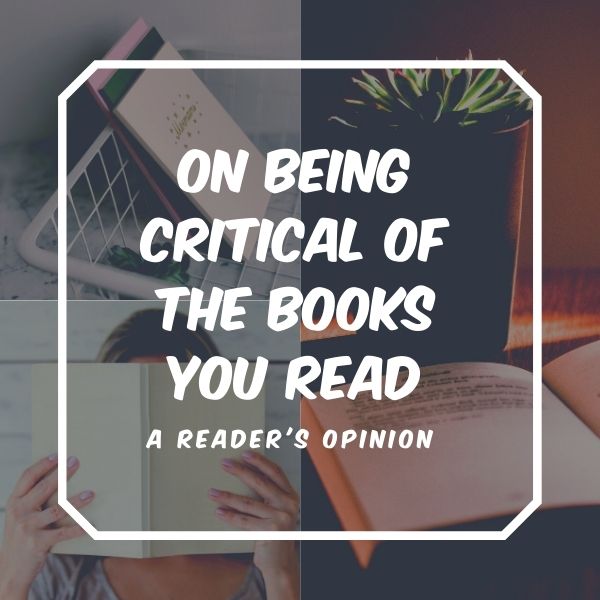If you are a person who makes reading a priority in your life, it is inevitable that every now and again, you will pick up a book and get an odd feeling about it. Sometimes you may or may not be able to put your finger on what it is exactly that makes the writing feel wrong, but you know it’s there. Other times, it will be possible to over-highlight the cringe-y lines of the book that make your skin crawl. When that happens, it is absolutely okay to put the book down. Even if it is something you were really excited to read because you’ve enjoyed that author’s work before. Even if it is one of the most-hyped books of the year. Even if it came to you as a gift from a family member, or as a recommendation from a bookish friend whose taste in books you trust. It is okay to stop reading when it just doesn’t serve you, or if it simply feels wrong.
As social and bookish people, especially during a pandemic when many are staying home when possible, once we’ve put that book down, we find the need to turn to our bookish online communities like bookstagram, Goodreads, or Twitter to share our thoughts on what we’ve read. This is where the way we engage with books, readers, and authors is important.
We can be critical about the books we consume and the authors we support. Actually, I think it’s an imperative moral obligation that we should be. In this context, I’m using the term critical as “exercising or involving careful judgment or judicious evaluation” as it applies to literature.
Reading is political, whether you choose to accept that or not, which makes the ways that we engage with books all the more crucial. In her editorial introduction to The Best American Short Stories 2018, Roxane Gay wrote: “If writers have a responsibility for how they narrate the world, certainly readers have a responsibility for what they consume and from whom.” As readers, it is our job to be selective about what we read, and to engage with it and other readers in discourse about a book’s merits and faults. More deeply, we choose whether or not we connect with the work, and sometimes the author.
In the short run, being critical of books means that we will not support outdated, racist or misogynistic ideas, or an author who spreads these kinds of ideas. (Many times, if something feels cringe-y, it is because the work includes this type of problematic content that you just cannot stomach.) In the long run, it means that we don’t perpetuate these ideas by recommending problematic material or problematic authors to other readers, especially to more impressionable readers like children and young adults. I appreciate people who flag these problems in books. Readers who engage in this kind of criticism have pointed out issues crucial to specific communities, which have led to small changes and improvements in the publishing industry. For example, Readers for Equality and Dignidad Literaria, groups that seek equity and fairness for BIPOC, and accountability from publishers, were formed in response to the mass protest about a book published earlier this year. Issues about the book were first brought up in a critique by Myriam Gurba.
However, it should be said that being critical is very different from being a bully simply for the sake of being one. If you have some sort of bookish platform online, it is one thing to share that you are DNFing a book (using DNF as a verb here) and providing some reasons as to why you are making that choice. In your analysis, you are being critical, and (hopefully) logical. Writing your honest thoughts about a book can help other readers decide whether or not they’d like to give it a try as well.
It is quite another thing to just flat-out say something like “this book sucks” or “I hate it.” It especially becomes extremely problematic when people go to such lengths as tagging the author and/or the publisher in these types of negative or book-bashing posts.
I think that when we pick up books, we can forget or fail to think about how much work went into it, how that piece of literature in our hands is someone else’s brain-child. On social media, the publishers and authors’ pages are so easily accessible that it is possible to forget that authors are people who don’t want to be baraged with negative, unfounded opinions. Authors know where to go if they want to find reviews of their work; they shouldn’t be tagged or mentioned on social media.
All this to say that being critical about the books and authors you consume and support is important and part of our job as readers, but there is a way to be critical without bashing people.


![On this episode of Feminist Book Club: The Podcast 💞 Sometimes we just wanna gush about the things we love.
For Renee (@reneethebookbird) and Margot (@neonmargot), it’s hardboiled fiction. For Ashley (@driedinkpen) and Nox (@nox_reads), it’s Lady Gaga’s new album. Tune in for two conversations around why we love the things we love.
Find this episode of Feminist Book Club: The Podcast anywhere you listen to podcasts or stream on our blog!
[alt text: Hardboiled Lesbian Fiction + Lady Gaga's Mayhem]](https://www.feministbookclub.com/wp-content/plugins/instagram-feed/img/placeholder.png)